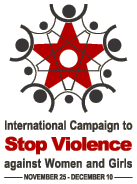 |
|
The International Campaign to Stop Violence against Women and Girls
25th November –10th December |
The International Campaign to Stop Violence against Women and Girls is part of an international campaign originating from the first Women’s Global Leadership Institute sponsored by the Center for Women’s Global Leadership in 1991. The dates November 25, International Day against Violence against Women and December 10, International Human Rights Day, were chosen to symbolically link violence against women and human rights, and to emphasise that such violence is a violation of human rights. Women the world over, organise during this period to call for the elimination of all forms of violence against women.
Organisations committed to fighting violence against women use this time as an opportunity to mobilise public opinion against all forms of violence against women and girls and to draw more people into the struggle for women’s rights.
This period includes various days commemorating or celebrating certain events as described below:
November 25 th – International Day to Stop Violence against Women
The day commemorates the murder of the Mirabal sisters, Patria, Maria Teresa and Minerva by the Trujillo dictatorship in the Dominican Republic in 1960. The sisters known as Las Mariposas (the butterflies) were killed because despite repeated imprisonments, they persisted in opposing the regime of Rafael Leonidas Trujillo. The deaths were set up to look like a car accident, and the killing of the sisters was an important factor in the overthrow of the Trujillo regime in 1961.
November 30 th – South Asian Women’s Day for Peace, Justice, Human Rights and Democracy
On October 23, 2002, at a South Asian Workshop on Gender, Peace and Development organised by SANGAT (South Asian Network of Gender Activists and Trainers), in Puri, India, participants from India, Pakistan, Nepal, Sri Lanka and Bangladesh decided to observe this dayas theSouth Asian Women’s Day for Peace, Justice, Human Rights and Democracy.
Women in South Asia have had to bear an unequal burden of the effects of conflict whether caste, class or ethnic, in addition to the violence of patriarchal structures. This day was designated
- to highlight how violence has pervaded the social fabric of all the countries in the region
- to protest against the militarisation of the region and
- to demand peace, justice, democracy and tolerance for all.
December 1 st – World Aids Day
This day is dedicated to assert the rights of those afflicted by HIV/AIDS. It is important to the women’s movement because it is a plea against persecution of the innocent. This is a day when the women’s movement reasserts its commitment to the cause of sex workers, who have often been unfairly targeted as the source of HIV. It is a day for solidarity with the gay and lesbian community, who have also had to face unjustified public ire for the spread of HIV/ AIDS.
December 3 rd – World Disability Day
Disabled people the world over organise events to demand an end to discrimination against differently abled people and the creation of a friendlier world for them. This is an occasion to focus on the added struggle of women with disabilities, as well as a declaration of solidarity with the movement for the rights of the differently abled.
December 3 rd – The Gas Leak at the Union Carbide factory, Bhopal, India (1984)
The leakage of the lethal gas methyl isocyanate from the Union Carbide factory in Bhopal unleashed one of the greatest industrial tragedies of all times. Innumerable people were rendered homeless; hundreds of people died, were disabled or afflicted with terrible ailments. The tragedy was compounded by the birth of several disabled babies in the affected area. Today, 15 years after the event, the rehabilitation of victims is yet to be completed.
December 6 th – The Anniversary of the Montreal Massacre (1989)
The day commemorates fourteen women engineering students who were gunned down in Montreal, Canada, by a 25 year-old man who believed that he was not accepted to engineering school because of women students. Before killing himself, he left behind a letter that contained a tirade against ‘feminists’.
December 6 th – Demolition of the Babri Masjid at Ayodhya, India (1992)
Adherents of the Hindu Right demolished a Muslim shrine at Ayodhya. This was followed by several brutal communal riots and a climate of distrust, hate and violence all over the country. Such an atmosphere has seen a spate of incidents where women’s bodies have been used as the battleground for fighting communal wars.
December 10 th – InternationalHuman Rights Day
The Universal Declaration of Human Rights, a common standard of achievement comprising 30 Articles to promote respect for the rights and freedoms for all peoples and all nations was adopted by the UN General Assembly in 1948. People and states celebrate the adoption of the Declaration which includes the Right to Equality, Freedom from Discrimination, Right to Life, Liberty, Personal Security and Right to Equality before the Law.
|
